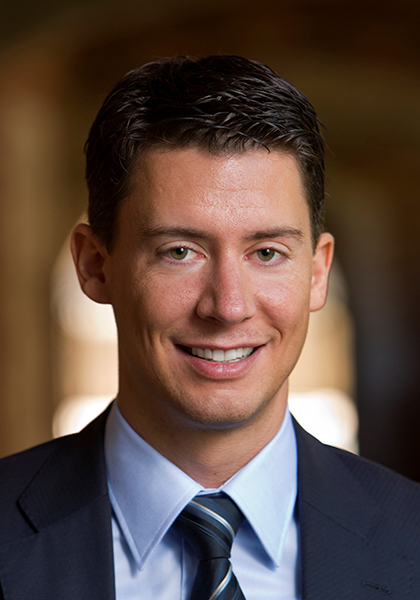Navigation auf uzh.ch
Navigation auf uzh.ch

When Mark Zuckerberg and his friends founded Facebook in 2004, Adrian Künzler had just completed his law degree at the University of Zurich. Fast forward 20 years, and Künzler is professor of trade and business law at his alma mater while the first-generation social network has mushroomed into the global platform known as Meta. The name change reflects Zuckerberg’s ambition to claim the lion’s share of the growing metaverse – the virtual world in which people meet to play, socialize, shop, work or learn. (See box)
While Meta, aka Facebook, is busy refining its virtual reality headsets, Künzler spends his time wrestling with the legal issues surrounding new internet technologies. He believes the interests of users should be foremost. Künzler was appointed to the WEF Global Future Council last year on the back of his reputation for expertise in this area. Around 600 leading international scientists sit on the council, dubbed the brain of the WEF, to discuss the big questions of our times. The body is composed of 30 different subsidiary councils dedicated to current topics such as artificial intelligence, environmental and energy questions, financial systems, quantum computing, and philanthropy. The councils steer and shape the content of the WEF talks in Davos.
The council to which Adrian Künzler was appointed is called Future of Metaverse. Such appointments are a great honor, reflecting the importance of a person’s academic work, so Künzler was thrilled to get the call: “Working together with leading researchers from around the world on solving major global challenges is hugely rewarding.” Legal questions pertaining to the internet and the metaverse are massively complex. They involve questions of privacy, data protection and intellectual property – i.e. how to uphold fundamental rights in a virtual space that transcends borders and is currently developing at an astonishing pace.

Anyone who is active in the metaverse should always know and be able to decide what data they are sharing.
For Künzler, the internet and related developments in the metaverse have turned the conventional understanding of private and public spheres on its head. “Laws relating to privacy and data protection were previously based on the assumption that we can choose between a private and public role.” But online and in the metaverse, these categories become more diffuse.
Our identities in the physical and virtual worlds are interlinked, for example if we assume a digital identity and upload medical data in order to consult with a real doctor in a virtual space. When and where are privacy rights applicable, and which ones? What about in the case of “digital twins”, which are gaining importance in medicine and can be used as virtual copies of our physiognomies when planning medical interventions?
Picture the metaverse as a growing digital space in which we spend increasingly large portions of our lives – socializing, shopping, working – leaving behind a personal trail of countless gigabytes worth of digital crumbs, and you’ll get some idea of the legal complexities of regulating privacy.
At present, there seem to be no limits to the relentless expansion of the digital realm, in our professional and personal lives alike. Large software companies are currently integrating AI applications into their programs, for example. They stealthily acquire data on our online activities and join the dots.
The circumstances lead to a surprising paradox: “We are operating anonymously in a public digital sphere, but what we do there is clearly visible,” says Künzler. This is because the platforms record our movements. To win back our right to a private life, technical safeguards guaranteeing privacy need to be built into the programs – and activated at the request of the user. “Anyone who is active in the metaverse should always know and be able to decide what data they are sharing,” suggests Künzler.
The concept could work in a similar way to biological safety systems which are categorized by risk level. For example, if a researcher is working with a highly infectious and dangerous virus such as HIV, the most stringent safety measures must be taken, but if they are using a harmless microbe, simpler measures will suffice. In the case of the metaverse, users would select the level of privacy needed to protect their data depending on the platform. Different areas of application could have different standard settings. The key would be that these systems, however they might work, would have to be user-friendly and not require users to read and agree to reams of terms and conditions that hardly anyone reads anyway, says Künzler.
Künzler shares the viewpoint of many experts that the success of the metaverse will be in part determined by the creation of user-friendly data-protection and privacy regulations for the sector. It is thus also in the interests of the owners of the platforms – whose valuations are dizzying – to find solutions to these questions. Revenue in the metaverse is currently estimated at around 15 billion dollars, mainly from gaming, e-commerce and advertising, with analysts predicting that those figures will increase to several hundred billion by 2030. Meta’s gaming and e-commerce platforms make it one of the heavyweights in the field. For the WEF Global Council, however, future business applications in industry, medicine or research are at the top of the agenda.
Whether the tech giants can be convinced to adopt user-friendly data-protection measures will probably depend on how much pressure the authorities are able to exert. Whatever happens, Adrian Künzler’s work – whether on the WEF council or in his research – will continue to focus on ensuring consumers regain sovereignty over their own data. For Künzler, the fundamental question is: to what extent can regulations prevent situations in which society is forced to silently adapt itself to new technologies? “Laws should contribute to supporting and increasing people’s agency as they interact with new technologies,” he concludes.